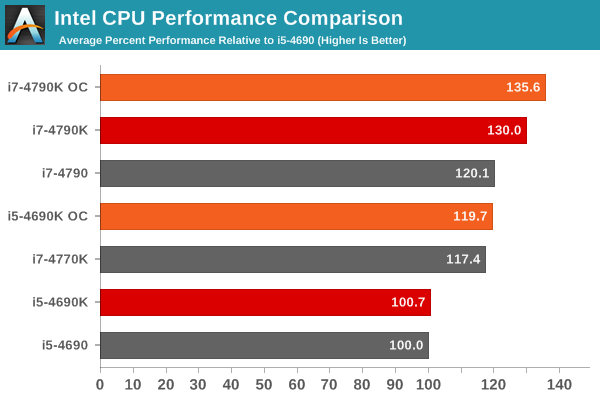Short Bytes: Intel's Devil's Canyon
by Jarred Walton on August 4, 2014 11:50 AM EST- Posted in
- CPUs
- Intel
- Overclocking
- Devil's Canyon
- Short Bytes

In early July, Intel released two new processors that go by the codename "Devil's Canyon" (DC). You can read our full review, but if you just want the executive summary it's pretty simple. Take the core processor design of Haswell (4th Generation Core Series) and modify the packaging to improve a few areas that will mostly be of interest to overclocking enthusiasts. Specifically, Intel has used a new Thermal Interface Material (NGPTIM) and they've added some capacitors to improve voltage stability/delivery. What does this mean to the layman? For most users, it means a drop in CPU core temperatures of around 10C under load, which can help with noise, cooling, and overclocking as well as improved performance.
There are only two DC CPUs at present, the i5-4690K and the i7-4790K. These are both K-series CPUs, so they're unlocked and target the overclocking enthusiast for a slight price premium, and they supersede the earlier i5-4670K and i7-4770K Haswell parts at similar prices ($5-$10 more). The only noteworthy specification changes: the TDP (Thermal Design Power) has been bumped from 84W to 88W, base/turbo clocks have been increased, and the DC CPUs are the first K-series parts to support VT-d and TSX-NI (mostly useful for workstation/server type environments). In the case of the i5-4690K, the jump in clock speeds is only 100MHz (base and turbo clocks), but the i7-4790K boasts a far more impressive 500MHz increase over the i7-4770K. The new CPUs should work with all 9-series and 8-series chipset motherboards, but 8-series boards will require a BIOS/firmware update so you'll want to verify compatibility before making a purchase.

What this boils down to is how much you want/need to increase CPU performance; you can see the quick summary of performance above. Without overclocking, the i5-4690K is functionally equivalent to the i5-4690 while costing $15 more, so it's almost solely targeted at overclockers. The i7-4790K on the other hand has the highest stock clocks of any CPU Intel has ever released; it's clocked 400Mhz higher than the i7-4790 while costing $25 more. That extra 400MHz translates into a 10-11% improvement in CPU clocks (9% overall performance increase on average), which is quite good all things considered – i7-4770K was only about 7% faster than i7-3770K on average in our testing. Gaming performance, if you're wondering, is largely bottlenecked by GPUs and so any of the CPUs listed above will result in very similar frame rates.
For those interested in overclocking, our internal testing suggests that the new sweet spot for maximum clocks on air/water is going to be around 4.7GHz, which is slightly improved from Haswell where there was more variability. Those chasing extreme overclocks who have already investigated other options for improving overclocking performance (e.g. delidding the CPU package to replace the TIM and integrated heatspreader) will likely find little to no difference between Haswell and DC. Unless you're after the top overclocking spot, DC isn't going to do much for enthusiasts who already own a fast CPU.
Users that aren't looking at overclocking will have an easier choice to make. If you're buying a new system, DC is of course worth considering, and the i7-4970K is the fastest consumer CPU to date. If you're thinking of upgrading, at the top of the product stack the i7-4790K still offers a 9% increase in average CPU performance over i7-4770K and 17% over i7-3770K, which is certainly enough to warrant consideration. But if you're running heavily threaded workloads, you're going to be better off waiting for Haswell-E and X99, which should bring 6-core and 8-core processor's to Intel's Extreme platform next month.










30 Comments
View All Comments
TiGr1982 - Monday, August 4, 2014 - link
Then go dig the pro/dedicated/geek overclockers forums - there are plenty of them out there.It's all there in numbers (but yes, this info is sparse and scarce and not in a single place - geek overclockers rarely bother to systematize the performance information, with a few exceptions).
MrSpadge - Monday, August 4, 2014 - link
Don't make it too complicated. If you finally find benchmarks with OC clock speeds comparable to yours they will probably have run at different memory settings, will have used not the software you're going to use etc.On average Ivy is about 6% faster per clock than Sandy, and Haswell is about 8% faster per clock than Ivy. Together you can expect on average 14.5% more performance per clock, plus whatever HT and the larger L3 cache give you in your applications. The latter is good for a few % at most, whereas the latter depends strongly on your software (0 - 30%).
A nice rule of thumb is that upgrades with less than a 50% CPU performance increase won't be subjectively noticeable. So if you're still pleased with your Sandy, don't upgrade yet. Devils Canyon can't change this obvious conclusion, which is valid since the initial launch of Haswell.
Impulses - Monday, August 4, 2014 - link
Good answer to his question right there, it's uninspiring that there still isn't anything worth upgrading to (unless you use your system for actual time sensitive work) but at the same time it's kind of satisfying that we might get as much mileage out of the trust 2500K/2600K as we did out of the old Q6600.klmccaughey - Monday, August 4, 2014 - link
YEah I will take that as a NO then. There is no point in upgrading. Will checlk back next tick or tock or whatever.idless - Monday, August 4, 2014 - link
Just upgraded to 4790k all the way from q6600. A very satisfying experience! Will be exciting to see how long the new CPU will last (as viable).TiGr1982 - Monday, August 4, 2014 - link
Well, this is not surprising, since i7-4790K is around 3 times faster than Core 2 Quad Q6600 (considering both at stock frequencies).This comparison case is actually a comparison case of the first & slowest and latest & fastest quad core Intel CPUs being produced up to date :)
slacr - Tuesday, August 5, 2014 - link
Ahh, I'm currently in the process of moving my Q6600 out of service, having run it as a server at stock speed with 1.15V since it was replaced by a 2500K for the gaming setup :)iamezza - Tuesday, August 5, 2014 - link
That bench comparo shows the 4690K as more than double the speed of the 2500K in all the gaming benchmarks. Something is messed up there.extide - Tuesday, August 5, 2014 - link
No, just read the charts man... The ones with the 2x speed increase are using the integrated Processor Graphics (HD3000 vs HD4600)HardwareDufus - Monday, August 4, 2014 - link
The article was titled 'Short Byte'.Why are so many of you complaining it's not a 7 course meal?
Me thinkest thou art of the 'give me everything now!' set.